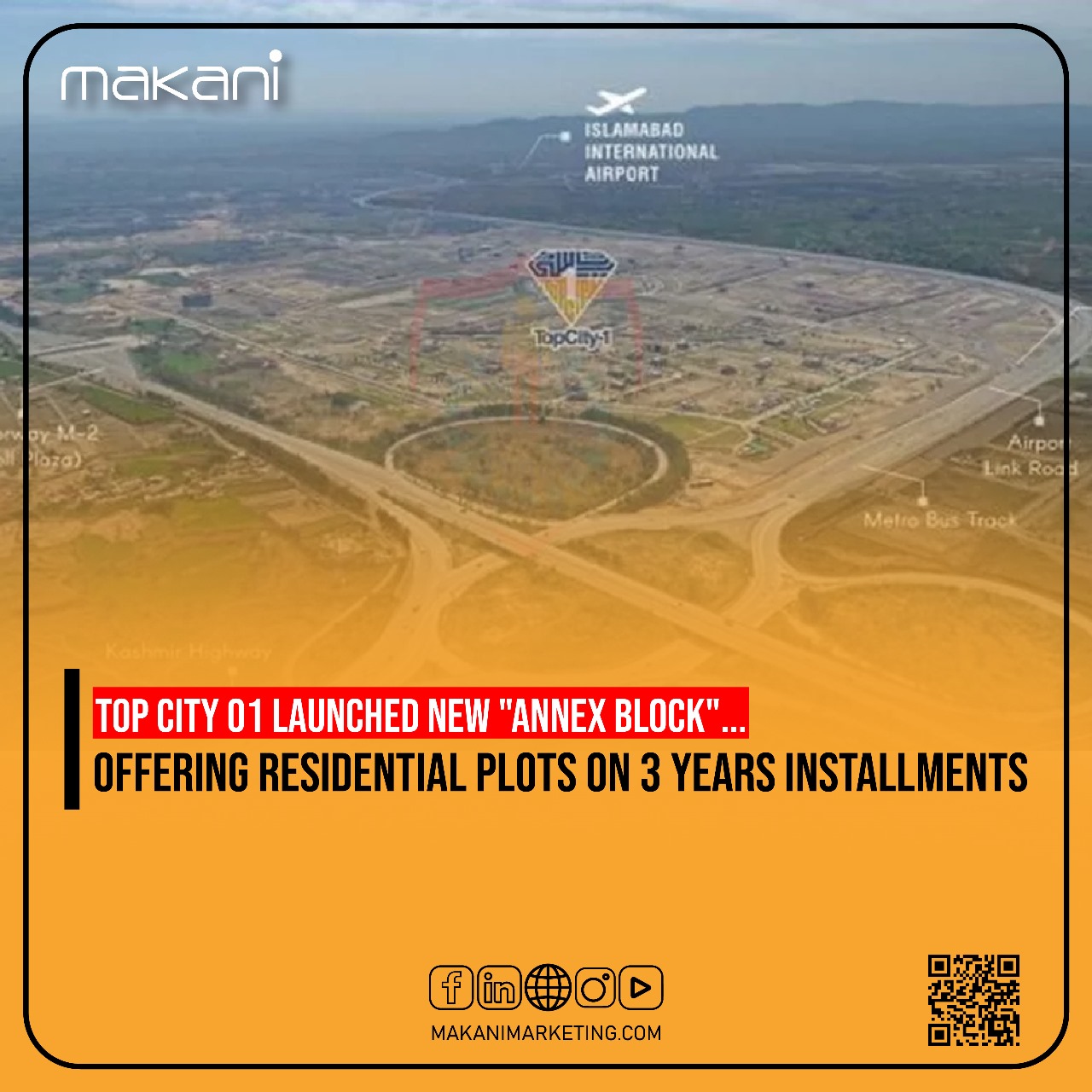In a pivotal move to safeguard Rawalpindi’s natural environment, the Rawalpindi Development Authority (RDA) has announced a ban on land transactions in agricultural zones outside the city’s peri-urban limits. This decision, spearheaded by RDA Director General Kinza Murtaza, aims to protect Rawalpindi’s green belt—a crucial element of the city’s ecological and environmental health. As the city grapples with rapid urbanization, this initiative is being hailed as a much-needed step towards balancing growth with environmental sustainability.
At Makani Marketing, we recognize the importance of maintaining Rawalpindi’s ecological integrity, and we fully support efforts to preserve the green belt and agricultural lands. As an organization deeply involved in Rawalpindi’s real estate and development landscape, we are committed to helping our clients navigate these changes while ensuring that urban development progresses responsibly.
The Green Belt and Its Vital Role in Rawalpindi’s Sustainability
The green belt surrounding Rawalpindi has long been a vital part of the city’s ecological framework. This stretch of land serves multiple functions: it helps mitigate air pollution, provides recreational spaces for residents, and supports biodiversity. However, in recent years, increasing construction activity has raised alarms about the encroachment of agricultural land and the loss of these essential green spaces. With rising demand for residential and commercial properties, the city has faced challenges in managing urban sprawl without compromising its environmental health.
The RDA’s new directive is aimed at halting the rampant conversion of agricultural land into commercial and residential developments. As per the new rules, land transactions in these agricultural areas outside the city’s peri-urban limits will be prohibited, ensuring that the region’s green spaces remain intact. The ban also sends a strong message that urban expansion must go hand in hand with environmental preservation.
Key Objectives Behind the RDA’s Decision
The primary objective behind this initiative is to protect Rawalpindi’s green belt, which plays a crucial role in maintaining the city’s ecological balance. The green belt acts as a buffer zone that mitigates the impact of urban pollution, prevents soil erosion, and offers much-needed recreational areas for the city’s residents.
Director General of the RDA, Kinza Murtaza, emphasized the importance of maintaining this delicate balance between urban development and environmental sustainability. In her statement, she noted, “The protection of the green belt is not only essential for Rawalpindi’s beauty and aesthetics but also critical for maintaining its ecological balance. As we advance urban development, it is our responsibility to preserve these green spaces for future generations.”
This initiative is part of a broader strategy by the RDA to address Rawalpindi’s rapid urban expansion. The city’s continued growth has often been at the expense of its natural resources, particularly agricultural land, and the RDA’s decision represents a significant step towards creating a more sustainable, livable city.
Public Response and Community Support
The ban on land transactions has received widespread support from residents of Rawalpindi, many of whom have expressed concern over the unchecked urbanization of their beloved city. Over the years, the unchecked growth of housing societies, often driven by land mafia groups and backed by corrupt officials, has led to the widespread destruction of agricultural land.
Local residents, particularly those from the Potohar region, have voiced their concerns about the loss of agricultural potential. Once a fertile area known for its vast agricultural lands, the region has suffered significantly due to the conversion of farmland into residential developments. Many locals are hopeful that the RDA’s decision will mark a turning point in the battle against urban sprawl and environmental degradation.
One resident, speaking out about the situation, said, “The land mafia has been exploiting agricultural land for years, turning fertile fields into housing societies that severely damage the environment. We hope that this new restriction on land transactions will be enforced with integrity to protect Rawalpindi’s future.”
Government’s Commitment to Urban Growth and Environmental Protection
The Rawalpindi Development Authority has assured the public that this decision is part of a long-term vision to foster responsible urban growth while ensuring the city’s natural resources are preserved for future generations. By restricting land transactions in agricultural areas, the RDA aims to prevent further encroachment and to protect the green belt from being reduced to concrete jungles.
This bold initiative aligns with the broader goal of integrating environmental sustainability into Rawalpindi’s urban development strategy. While the city continues to grow, it is crucial that development occurs in a way that respects and nurtures the natural landscape.
For developers, builders, and real estate professionals, the RDA’s decision serves as a reminder of the importance of adhering to sustainable development practices. At Makani Marketing, we are committed to offering solutions that contribute to this vision. As experts in Rawalpindi’s real estate sector, we provide comprehensive advice and services that help our clients align their projects with the city’s environmental guidelines.
Enforcement of the Ban: The Role of the Governance Redressal Committee
To ensure that the ban is implemented effectively, the RDA has called for immediate action from the Deputy Commissioner of Rawalpindi to halt any land transfers in the affected areas. In addition to this, the RDA has established a Governance Redressal Committee to handle grievances and concerns from individuals and organizations impacted by the new restrictions.
The committee serves as an open channel for discussions and feedback, providing an opportunity for residents, businesses, and developers to express their views. This transparent approach aims to mitigate any negative impacts while ensuring that the overall goal of environmental protection is achieved.
While the enforcement of this ban is expected to have an immediate effect on land transactions, it will be closely monitored to ensure that it leads to a reduction in agricultural land encroachment. The RDA has committed to ensuring that any violations of the new guidelines are met with strict penalties.
Challenges and the Path Forward
Despite the widespread support for the RDA’s decision, the road to full enforcement will not be without its challenges. Rawalpindi’s urbanization trend has long been driven by a booming real estate market, and many developers may resist the new restrictions. The issue of land mafia groups and corruption within local authorities also remains a concern, as these entities have historically exploited agricultural land for profit.
However, the RDA’s strong stance on this issue indicates a shift toward more responsible and sustainable development. Moving forward, it will be essential for both government bodies and private sector stakeholders, including those in the real estate industry, to work together to balance growth with environmental preservation.
At Makani Marketing, we believe that responsible urban planning is the key to building a sustainable and thriving city. We support initiatives like the RDA’s ban on land transactions in agricultural areas, as they ensure that future generations will inherit a city that is not only economically prosperous but also environmentally healthy.
Also Read: Major Changes to UK and EU Travel in 2025: What You Need to Know
Conclusion: A Step Towards Sustainable Urbanization
The RDA’s ban on land transactions in Rawalpindi’s agricultural areas marks an important step toward preserving the city’s green belt and ensuring that its natural resources are protected for the future. As Rawalpindi continues to expand, it is crucial that urban development occurs in harmony with the environment.
At Makani Marketing, we are dedicated to helping our clients navigate these changes in a way that respects Rawalpindi’s natural beauty and ecological integrity. By staying informed and adapting to these new regulations, developers and real estate professionals can play a vital role in shaping a sustainable, green future for Rawalpindi.
If you’re looking to invest or develop property in Rawalpindi, reach out to us at Makani Marketing for expert guidance and advice that ensures your projects align with the city’s sustainable growth vision.










